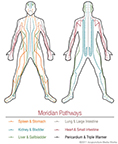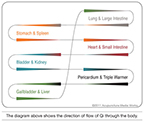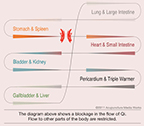What Is Acupuncture?

Acupuncture is an effective form of medical treatment that has evolved into a complete holistic health care system. Practitioners of acupuncture and Chinese medicine have used this noninvasive treatment method to help millions of people become well and stay well.
Acupuncture promotes natural healing. It can enhance recuperative power and immunity, support physical and emotional health, and improve overall function and well-being. It is a safe, painless and effective way to treat a wide variety of medical problems.
What is Qi?
At the core of this ancient medicine is the philosophy that Qi (pronounced “chee”), or vital energy, flows throughout the body. Qi animates the body and protects it from illness, pain and disease. A person’s health is influenced by the quality, quantity and balance of Qi.
Acupuncture promotes natural healing. It can enhance recuperative power and immunity, support physical and emotional health, and improve overall function and well-being. It is a safe, painless and effective way to treat a wide variety of medical problems.
What is Qi?
At the core of this ancient medicine is the philosophy that Qi (pronounced “chee”), or vital energy, flows throughout the body. Qi animates the body and protects it from illness, pain and disease. A person’s health is influenced by the quality, quantity and balance of Qi.

How does Qi move?
Qi flows through specific pathways called meridians. There are fourteen main meridians inside the body. The diagram to the left shows the meridian pathways in the body. Each of these is connected to specific organs and glands.
Meridian pathways are like rivers flowing inside the body. Where a river flows, it transports life-giving water that provides nourishment to the land, plants and people. Similarly, where meridian pathways flow, they bring life-giving Qi that provides nourishment to every cell, organ, gland, tissue and muscle in the body.
Qi flows through specific pathways called meridians. There are fourteen main meridians inside the body. The diagram to the left shows the meridian pathways in the body. Each of these is connected to specific organs and glands.
Meridian pathways are like rivers flowing inside the body. Where a river flows, it transports life-giving water that provides nourishment to the land, plants and people. Similarly, where meridian pathways flow, they bring life-giving Qi that provides nourishment to every cell, organ, gland, tissue and muscle in the body.

How is Qi disrupted?
An obstruction to the flow of Qi is like a dam. When Qi becomes backed up in one part of the body, the flow becomes restricted in other parts. This blockage of the flow of Qi can be detrimental to a person’s health, cutting off vital nourishment to the body, organs and glands.
Physical and emotional trauma, stress, lack of exercise, overexertion, seasonal changes, poor diet, accidents, or excessive activity are among the many things that can influence the quality, quantity and balance of Qi.
Normally, when a blockage or imbalance occurs, the body easily bounces back, returning to a state of health and well-being. However, when this disruption is prolonged or excessive, or if the body is in a weakened state, illness, pain, or disease can set in.
An obstruction to the flow of Qi is like a dam. When Qi becomes backed up in one part of the body, the flow becomes restricted in other parts. This blockage of the flow of Qi can be detrimental to a person’s health, cutting off vital nourishment to the body, organs and glands.
Physical and emotional trauma, stress, lack of exercise, overexertion, seasonal changes, poor diet, accidents, or excessive activity are among the many things that can influence the quality, quantity and balance of Qi.
Normally, when a blockage or imbalance occurs, the body easily bounces back, returning to a state of health and well-being. However, when this disruption is prolonged or excessive, or if the body is in a weakened state, illness, pain, or disease can set in.